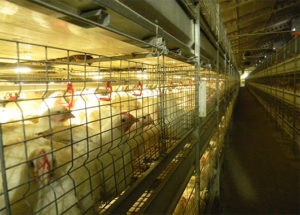First of all, calcium should be supplemented for chickens raised in layer cages. Calcium content is very important in any growth stage of laying hens. Especially during the laying period is particularly important. Therefore, farmers should pay attention to calcium supplementation during the peak period of laying hens. Feed the laying hens with calcium from 12:00 to 18:00 every day. The calcium content in the diet of laying hens is generally higher than 3%. During the peak period of egg production (egg production rate of more than 80%), the calcium content in the diet can be increased to 3.5% to 4%. When the egg production rate is between 65% and 80%. The calcium in the diet should be maintained at 3% to 3.25%.
While using breeding equipment to raise chickens. There is to add some green fodder. The green fodder is rich in protein, vitamins, chlorophyll and many unknown nutritional factors. Therefore, farmers should properly feed some green feed during the peak period of laying hens. It can activate the reproductive function of chickens and increase egg production.

Eggs are rich in protein, so during the laying period, farmers must ensure the intake of protein feed for laying hens. Each egg lays about 12 grams to 15 grams of protein. When the egg production rate reaches 90%, a diet containing 19% protein must be fed, and when the egg production rate reaches 70%, a diet containing 17% protein must be fed. Generally, for every 10% increase in egg production rate, the protein level in the diet will increase by about 1%.
The length and intensity of light have an impact on laying hens. Light has a significant stimulating effect on gonadal activity. Light supplementation generally starts at 21 weeks of age, and increases by half a week for 21 to 24 weeks of age. After 25 weeks of age, add half an hour of light every 2 weeks until the daily light time reaches 16 hours.
In order to maintain a good laying rate of laying hens, the health of laying hens is very important, especially during the peak period of laying, when its reproductive function is strongest, its metabolism is strongest, and it is the period when the most protein is synthesized. At this time, the chicken body is under huge production stress, its resistance is weak, and it is easy to get sick. Special attention must be paid to environmental and beverage hygiene to prevent the chickens from being infected by pathogenic bacteria.
The use of layer cages to raise chickens can increase the number of chickens raised, and allows the layers to live in a comfortable environment, and the growth of good natural productivity will be higher. Therefore, qualified customers are still recommended to use layer cages to raise chickens.
